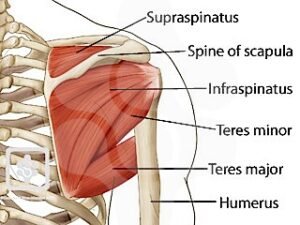One of the most common causes of shoulder pain is due to injury to the rotator cuff, which is comprised of a group of four muscles and tendons that surround the shoulder joint, providing the shoulder with both stability and movement. The tendons from these muscles merge into a single rotator cuff tendon that attaches to the top of the humerus. Most rotator cuff problems involve injury to the tendons, though the muscles are also sometimes involved.
Athletes such as swimmers and tennis players, who practice sports that involve a lot of movement of their arms over their head, are more likely to suffer from this injury, as are those over age 40, due to the normal loss of elasticity and degeneration that comes with aging. Injuries can be caused by a direct blow to the shoulder, falling on the arm when it is outstretched, or having the arm yanked. It is more likely for the rotator cuff to be injured when the muscles of the shoulder area have been weakened by inactivity. The most common injuries to the rotator cuff are tendonitis and rotator cuff tears.
 A rotator cuff tear can be either a result of a direct injury to the arm or may evolve from rotator cuff tendonitis (also called impingement syndrome). Impingement syndrome occurs when the tendons of the rotator cuff rub against the shoulder blade, causing it to become inflamed, fray, and weaken. Arthritis and bone spurs can also contribute to this condition. A symptom that you may have a torn rotator cuff is having a dull ache in the upper arm and shoulder that may extend down to the elbow, especially when moving the arm over the head.
A rotator cuff tear can be either a result of a direct injury to the arm or may evolve from rotator cuff tendonitis (also called impingement syndrome). Impingement syndrome occurs when the tendons of the rotator cuff rub against the shoulder blade, causing it to become inflamed, fray, and weaken. Arthritis and bone spurs can also contribute to this condition. A symptom that you may have a torn rotator cuff is having a dull ache in the upper arm and shoulder that may extend down to the elbow, especially when moving the arm over the head.
Treatment options include rest, pain killers and/or herbal remedies, ice packs, chiropractic care, acupuncture, cold laser, Graston treatment for conservative approach and steroid injections, or surgery for the cases that are non-responsive to conservative approaches. Many rotator cuff injuries heal by themselves in time, and using an NSAID such as ibuprofen may help to reduce inflammation and control pain. Ice packs can also be applied to the shoulder for this purpose (bags of frozen vegetables work well too!)
Your chiropractor can use a range of treatments to first address the pain and inflammation of a rotator cuff tear. These may include ultrasound, electrical muscle stimulation, heat, and ice treatments. Then chiropractic adjustments and targeted exercises are used to restore mobility and increase range of movement, without having to resort to steroid injections or surgery. After approximately six to eight weeks of treatment, most patients are able to resume normal activities.
In some cases, surgery may be indicated if there has been a complete tear. This can involve widening the space through which the rotator cuff tendon passes, which releases the trapped tendon, or repairing the tendon itself.
The following links are the treatment options provided in our office for rotator cuff conditions.
For more information or free consultation, call us at 303-750-3000.
Disclaimer: These statements have not been evaluated by the Food and Drug Administration. The products mentioned on this page are not intended to diagnose, treat, cure, or prevent any disease. The content in this blog should not be used as a substitute for the professional advice and/or recommendation of qualified healthcare practitioners or licensed physicians. The content presented in this blog is intended for information purposes only. Consult your doctor or healthcare practitioners for your current conditions.
ChiroPlus Wellness Care, LLC
303-750-3000
10700 E. Bethany Dr #207, Aurora, CO 80014